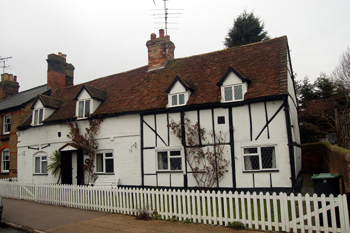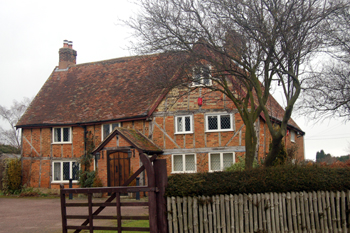The Talbot Inn Clophill

7 and 9 The Green, February 2010
The Talbot Inn: "near Clophill Bridge"
The exact site of the Talbot is not known. The only references to it in documents held by Bedfordshire Archives are in deeds from the 17th century in the Lucas Archive. In fact, the inn is something of an enigma and might have been in one of two widely sundered places or, of course, neither of them!
In June 1654 Lord of the Manor of Beadlow, Saint John Charnock of Hulcote mortgaged property to Humphrey Monoux [ref: L4/51]. One of the properties mortgaged was the Talbot Inn, described simply as being near Clophill Bridge. It had twelve acres of land adjoining. Clophill Bridge lies south-east of The Green. Interestingly, when Clophill was assessed in 1927 under the terms of the Rating and Valuation Act 1925 the valuer visiting 7 and 9 The Green, which were built around 1700 according to their listing by the former Department of Environment but could, of course, be earlier, used to be a pub. It would require an active folk memory to remember that these buildings had been an inn over two hundred years before.

The Old Priory House, February 2010
In December 1655 Saint John Charnock conveyed the Manor of Beadlow to Robert, Lord Bruce, later 2nd Earl of Elgin [ref: L4/53]. The inn known "by the sign of the Talbot" in the occupation of John Kent along with 66 acres of arable and 13 acres of pasture in Beadlow was included in the sale. This suggests a location somewhere near the site of Beadlow Priory and the later Old Priory House (which is of a similar date) and Top Farm rather than near The Green in Clophill - perhaps the bridge meant was BeadlowBridge, crossing The Flitt just south of Top Farm. The current bridges are estimated by the Bedfordshire Historic Environment Record [HER 15693] to be 18th century.
The last mention of the inn is in 1685 when the inn with sixty acres of adjoining land and other property was conveyed by Robert, Earl of Ailesbury to Charles Pigeon of Grays Inn [Middlesex] with Simon Urlin of Ampthill as his trustee.
A third possibility is that the Talbot might have been a forerunner of the Flying Horse, which might have been built on the site in the 18th century. Without further evidence it is anyone's guess!
List of Licensees: note that this is not a complete list. Italics indicate licensees whose beginning and/or end dates are not known:
- 1655: John Kent.
List of sources at Bedfordshire Archives:
- L4/51: Mortgage: 1654;
- L4/53: Conveyance: 1655;
- L4/59: Feoffment: 1685